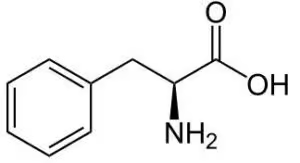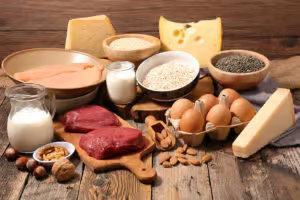Table of Contents
Phenylalanine is a highly bio-available essential amino acid. Your body naturally converts L-Phenylalanine into the amino acid L-Tyrosine which is then converted into L-DOPA. Decarboxylation of L-DOPA results in synthesis of the neurotransmitter dopamine.[i]
Once converted into dopamine, the enzyme dopamine-beta-hydroxylase converts dopamine into the neurotransmitters norepinephrine (noradrenaline) and epinephrine (adrenaline). This triad of neurotransmitters are collectively referred to as “catecholamines”.
As a nootropic supplement, you may find several different forms of Phenylalanine available. L-Phenylalanine is the natural form found in proteins. D-Phenylalanine is a mirror image of L-Phenylalanine that is made in the lab. And DL-Phenylalanine is a combination of the two forms.[ii]
L-Phenylalanine can be a highly effective nootropic for boosting cognitive function because it boosts norepinephrine and dopamine production. Resulting in increased attention, motivation and working memory.
D-Phenylalanine (but not L-Phenylalanine) has been used to treat chronic pain although the clinical research in this area is sparse.
L-Phenylalanine also stimulates the production of thyroid hormones T3 (triiodothyronine) and T4 (thyroxine) which are crucial in maintaining both overall physical and cognitive health.
Phenylalanine helps:
- Cognitive Stress. L-Phenylalanine helps produce the catecholamine-triad of neurotransmitters dopamine, norepinephrine and epinephrine. Sleep deprivation and extreme stressors like heat and cold can deplete catecholamine levels. L-Phenylalanine restores them to preserve optimal cognition.[iii]
- Neurotransmitters. Phenylalanine is a necessary precursor for dopamine, norepinephrine and epinephrine. As your dopamine levels increase, you’re better able to concentrate, organize your thoughts, and stay productive.
- Attention Deficit Disorder (ADHD). L-Phenylalanine can be an effective treatment for some with ADHD symptoms. L-Phenylalanine works in synergy with pharmaceutical drugs like Ritalin and Adderall by boosting extracellular levels of dopamine. Helping these drugs be more effective. And mitigating side effects like crashes when the drug wears off.
Overview
L-Phenylalanine is an essential amino acid that you get from food or a supplement. The enzyme phenylalanine hydroxylase converts Phenylalanine in your liver into the amino acid L-Tyrosine.[iv]

Phenylalanine is found in protein-rich foods like soybeans, cheese, nuts, seeds, beef, lamb, chicken, pork, fish, eggs, dairy, beans, and whole grains. The artificial sweetener aspartame also contains Phenylalanine.
Your brain converts L-Tyrosine to L-DOPA which then produces the neurotransmitter dopamine. The unused dopamine is then further converted into the neurotransmitters norepinephrine (noradrenaline) and epinephrine (adrenaline). This triad of neurotransmitters are collectively referred to as “catecholamines”.
Many neurohackers prefer L-Phenylalanine over other catecholamine precursors because it supports neurotransmitter production without directly increasing neurotransmitter levels.
This last part is key because indiscriminately increasing neurotransmitters across the board can lead to imbalances and tolerance. Which can defeat the purpose of taking the nootropic in the first place.
For example, not enough epinephrine can decrease cognition. And too much norepinephrine can decrease attention, processing speed and executive function.[v]
L-Phenylalanine vs. D-Phenylalanine: What’s the Difference?
L-Phenylalanine is an essential amino acid which means you must get if from food. Or as a supplement. Your body cannot synthesize Phenylalanine on its own.
L-Phenylalanine (LPA) is converted into the amino acid L-Tyrosine in your liver. Once L-Tyrosine crosses the blood-brain barrier, it is converted into L-DOPA. Which is further converted into the neurotransmitters dopamine, norepinephrine (noradrenaline) and epinephrine (adrenaline).
D-Phenylalanine (DPA) is a synthetic version of, and mirror image of L-Phenylalanine created in the lab. DPA has a different mechanism of action in the body than LPA.
D-Phenylalanine (DPA) slows the action of the enzymes carboxypeptidase A or endorphinase and enkephalinase. These enzymes degrade endorphins. Slowing down these enzymes that reduce endorphins can help reduce pain.[vi]
DL-Phenylalanine is a 50/50 combination of L-Phenylalanine and D-Phenylalanine. By combining the two in theory you get the best of both an antidepressant and pain reducer.
How does L-Phenylalanine work in the Brain?
L-Phenylalanine boosts brain health and function in several ways. But two in particular stand out.
- L- Phenylalanine decreases depression. L-Phenylalanine is converted into L-Tyrosine which in turn is converted into L-DOPA in the brain. L-DOPA is then used to make the feel good neurotransmitter dopamine. So depression could be the result of not getting enough of the first amino acid (L-Phenylalanine) in the chain of events needed to produce dopamine.
In one study done in Germany, 20 depressed patients received from 75-200 mg per day of DL-Phenylalanine for 20 days. At the end of the trial 12 of the depressed patients could be discharged without any further treatment. 4 of the patients had a moderate decrease in depressive symptoms. And 4 patients showed no response.[vii]
- L-Phenylalanine boosts neurotransmitters. L-Phenylalanine turns into L-Tyrosine once taken as a supplement. It then converts into the neurotransmitter dopamine. Dopamine is used to control movement in your body, is fundamental to memory, attention and problem solving.
The unused dopamine can then convert into the neurotransmitters norepinephrine (noradrenaline) and epinephrine (adrenaline).
Norepinephrine is important for attentiveness, emotions, sleeping, dreaming and learning.
Epinephrine drives your ‘flight-or-flight’ response. It’s what prompts your reaction to dangerous circumstances, emergency situations, or in stressful situations or environments.
This balance in neurotransmitters is critical to the fully optimized, healthy brain. And why some neurohackers choose L-Phenylalanine to allow the body to make the neurotransmitters it needs. Instead of causing an imbalance by boosting one neurotransmitter over another.
A study in Venezuela investigated ADHD and autism, and the implications of amino acids on these neuropsychiatric disorders. 40 subjects affected by autism and 11 with ADHD along with 41 healthy subjects were included in this study.
The researchers found that those with ADHD had decreasing Phenylalanine and increasing glycine which disrupted their inhibitory neurotransmission system. Not enough phenylalanine and increasing lysine was present in those with autism.[viii]
Another study at Ohio State University looked at amino acids in 28 ADHD patients. And found all subjects with ADHD had significantly lower levels of the amino acids phenylalanine, tyrosine, tryptophan, histidine, and isoleucine. The researchers concluded each subject had a general deficit in amino acid transport, absorption or both.[ix]
How things go bad
As we get older, our brain and body chemistry and energy metabolism changes.
↓ Dopaminergic neurons are damaged or die
↓ Neurotransmitter levels decline
↓ Thyroid hormones decline
↑ Stress levels increase
↓ Working memory and mood decline
All of these changes are often attributed to aging. But could be a result of dietary and lifestyle choices. Unchecked, they could lead to neurodegenerative diseases like Parkinson’s, a drop in quality of life and depression.
L-Phenylalanine benefits
L-Phenylalanine can boost levels of the neurotransmitters dopamine, norepinephrine and epinephrine. And can help a sluggish thyroid produce more T4 and T3.
L-Phenylalanine can help boost cognition especially in stressful situations. It helps improve decision making, ‘flow state’ and creativity, cognitive flexibility, and working memory.
L-Phenylalanine converts into L-Tyrosine which then converts into L-DOPA to produce dopamine. L-DOPA is also used to make melanin in your body. This conversion process helps in the removal of neurotoxic quinones. And chelates heavy metals like mercury and lead which can accumulate in and damage neurons.
The dopamine that is not used by your brain is available to produce norepinephrine (noradrenaline) which is important for attentiveness, emotions, sleeping, dreaming and learning.
L-Phenylalanine may be an effective nootropic when stacked with ADHD/ADD meds like Ritalin or Adderall. It helps supply extracellular dopamine needed to improve the effectiveness of stimulants used to boost the uptake of dopamine in your brain.
How does L-Phenylalanine feel?
Keep in mind that L-Phenylalanine is a precursor to catecholamines. So if you’re not ‘low’ on dopamine, norepinephrine or epinephrine – you may not ‘feel’ anything.
Many neurohackers report a lift in mood, better focus, concentration, increased energy, and an overall sense of well-being. L-Phenylalanine can help readjust your motivation levels. It can help lower anxiety levels, especially social anxiety.
Supplementing with L-Phenylalanine can help bring your blood pressure down if its elevated from a stressful situation or environment. Take it before the stressful event if you can.
L-Phenylalanine helps buffer the effects of stimulants like caffeine or amphetamines. It helps potentiate and prolong the effects of Ritalin or Adderall, and reduces the crash.
If you’re into athletics or do manual work, you’ll find that supplementing with L-Phenylalanine before a workout or construction job can leave you feeling great afterwards. It may help mitigate many of the effects of acute stress caused by short-term stressors.
And L-Phenylalanine helps your body produce L-Tyrosine which helps to produce melanin, so you may find it easier to get a tan while at the beach.
L-Phenylalanine Clinical Research
Phenylalanine as an Antidepressant
Several studies have investigated using Phenylalanine for the treatment of depression. One study published in the journal Arzneimittel-Forschung looked at using DL-Phenylalanine in a small group of patients who failed to respond to popular antidepressants like MAOIs.
In this study, researchers worked with 23 patients diagnosed with depression and who had not responded to standard antidepressants. They were given 50 or 100 mg of Phenylalanine daily for 15 days. The researchers found that Phenylalanine completely improved mood in 17 of the patients. Within 13 days of the 15-day trial.[x]
Another study in the Journal of Neural Transmission studied DL-Phenylalanine use with 20 depressed patients. The subjects were given 75 – 200 mg/day of DL-phenylalanine for 20 days.
The study found that 8 patients completely recovered from depression. And another 4 experienced a significant improvement in mood. Another 4 patients saw mild to moderate improvements, and another 4 did not respond to treatment.
This study shows that Phenylalanine has considerable antidepressant properties. And is effective for the majority of people suffering from depression.[xi]
Phenylalanine for ADHD
Phenylalanine for ADHD seems at first glance as a natural solution for ADHD symptoms. It’s a precursor to the neurotransmitter dopamine which is targeted with stimulants like Ritalin and Adderall. But the very limited clinical evidence tell a different story for practical use.
In this double-blind crossover study, 19 patients with ADD were given DL-phenylalanine or a placebo for 2 weeks. 13 of the ADD patients experienced a significant improvement in ADD symptoms compared to the placebo. And patients saw an improvement in mood.
But the patients who did respond to DL-Phenylalanine lost all positive benefits within 3 months. And it’s interesting that a later study with ADHD patients using L-phenylalanine (not DL-Phenylalanine) produced no clinical benefit.[xii]
Another study from 1987 treated 11 hyperactive boys for 2 weeks with D-Phenylalanine. There was no significant improvement or deterioration in behavior.[xiii]
There is a modern school of thought that there are several different types of ADD and ADHD. And the symptoms are caused by malfunctions in different parts of the brain depending on the ‘type’ of ADHD.
The bottom line is some dealing with ADHD may benefit from supplementing with Phenylalanine. And that DL-Phenylalanine may be the best option. Try it and see if it works for you.
L-Phenylalanine Recommended Dosage
 L-Phenylalanine suggested dosage for cognitive benefit is 500 mg up to 3-times per day.
L-Phenylalanine suggested dosage for cognitive benefit is 500 mg up to 3-times per day.
You may find your body responds to smaller doses. Or even more if your stacking it with stimulants like ADHD meds. Listen to your body and see how you react.
Since L-Phenylalanine is an amino acid, for best absorption and so it’s not competing with other amino acids, take it at least an hour before food. L-Phenylalanine works best on an empty stomach.
And take L-Phenylalanine with Vitamin B6 and Vitamin C to further maximize absorption. And give your body what it needs to produce the neurotransmitters dopamine, norepinephrine and epinephrine.
L-Phenylalanine is also needed along with L-Tyrosine to synthesize the CoQ10 needed to create fuel within your brain’s mitochondria.
L-Phenylalanine Side Effects
L-Phenylalanine quickly turns into the non-essential amino acid L-Tyrosine once you take it. So is considered non-toxic and very safe. Most neurohackers don’t have any negative side effects.
Important Caution: People with phenylketonuria (PKU), and women who are breastfeeding or are pregnant, should not take phenylalanine supplements. PKU is an inherited condition where excess phenylalanine can build up in your body. Aspartame, found in artificial sweeteners such as NutraSweet, is a source of phenylalanine. People with PKU should not use aspartame. If you are pregnant, ask your doctor about using this artificial sweetener.[xiv]
At higher doses there are reports of stomach issues and migraines. Experts say that L-Phenylalanine is toxic in doses above 5000 mg. And higher doses will not give you any added benefit.
If you try recommended doses of L-Phenylalanine and do not feel any benefit, then this nootropic may not be right for you. You could try L-Tyrosine or NALT instead.
L-Phenylalanine can increase your thyroid hormones. So if you’re hyperthyroid you shouldn’t use L-Phenylalanine.
And if you’re taking MAO inhibitors (MAOI’s) like selegiline, Azilect, Marplan or Nardil you should not use L-Phenylalanine. MAOI’s work in your brain and affect neurotransmitters. So using L-Phenylalanine in combination with MAOI’s could throw off the delicate balance of neurotransmitters needed for optimal brain health and cognition. And taking L-Phenylalanine with MAOI’s could cause a severe increase in blood pressure which could lead to a heart attack or stroke.
Other sides effects which can accompany unusually high doses of phenylalanine can include anxiety, rapid heart beat, restlessness, heart palpitations or high blood pressure. If you are dealing with or on medication for high blood pressure you should not use L-Phenylalanine.
Type of Phenylalanine to buy
L-Phenylalanine is available in powder, capsule and tablet form. Capsules and tablets are usually 500 mg.
Phenylalanine is also available as D-Phenylalanine and the 50/50 combined form of DL-Phenylalanine. You may find one form works better for you than another.
Ensure you read labels carefully, and stick with manufacturers who follow Good Manufacturing Practices (GMP). And are GMP-Certified.
Nootropics Expert Recommendation
L-Phenylalanine 500 mg up to 3-times per day
 I recommend using L-Phenylalanine as a nootropic supplement.
I recommend using L-Phenylalanine as a nootropic supplement.
Your body does synthesize some L-Tyrosine from phenylalanine which comes from high-protein foods like chicken, fish, almonds, avocados and bananas.
But most of us don’t get enough L-Phenylalanine from our diet. So supplementation will help. And L-Phenylalanine is a highly bioavailable, natural form of this amino acid. So you should feel its effects faster.
L-Phenylalanine is helpful for most neurohackers to combat stress and sleep deprivation. It’ll boost dopamine, norepinephrine and epinephrine levels.
It’s particularly helpful if you take L-Phenylalanine prior to a stressful situation, workout or physically demanding job.
L-Phenylalanine could be helpful to those dealing with ADHD/ADD. It’s a great compliment to stack with stimulant meds like Ritalin or Adderall. L-Phenylalanine will provide the dopamine your brain needs. It will help smooth out and prolong the effects of stimulant meds. And help prevent the associated crash when they wear off.
You can safely use up to 1,500 mg per day when stacking with ADHD meds. But dosed throughout your day.








Join The Discussion - 141 comments
Laura
January 5, 2019
Hello David!!
I’m using D,L Phenylalanine 500mg from lifeExtension, works wonderfully for me!!!
Now, my question is, how long should i take this supplement? And i have the same question for all my vitamins!! How long to use them!? As long as i feel good?? 🙂
And one more question!!!
What’s the difference some of the brands put DLPA DL phenylalanine and some just DL Phenylalanine! Is it the same? , because I’m try to get something cheaper but I’m not sure !
Thenk you so much, you’re a genius!!!
David Tomen
January 5, 2019
Laura, see the section above titled, “L-Phenylalanine vs. D-Phenylalanine: What’s the Difference?”. One is synthetic and the other natural. Both have shown different benefits in clinical trials.
See “dosage notes” for this nootropic and for each of the vitamins and minerals you are using. You’ll find the full review including dosage notes either in this list: https://nootropicsexpert.com/nootropics-list/ or in one of the posts in this list: https://nootropicsexpert.com/blog/
Shane
December 7, 2018
DLPA helps me tremendously with all my ADHD symptoms. In fact, other than Concerta which I have unfortunately had to stop due to the side effects, nothing has helped me more. I am calmer ( less overwhelm and anxiety), more focused, more confident, and less of that ADHD anger.
I have tried L-Tyrosine, NALT, and Mucuna Pruriens. I notice a slight improvement with L- Tyrosine and Macuna Pruriens, but I will experience side effects such as irritability with NALT. None of these come close to DPLA for me.
I didn’t take DPLA while on Concerta. Once I am able to see the doc and get on a new med I may experiment with taking DPLA along with it.
I appreciate your articles. I am glad I stumbled onto your site.
David Tomen
December 7, 2018
Thank you Shane. Valuable input. Much appreciated.
John
December 4, 2018
Enjoy your videos and your detailed documentation on your website.
Since Phenylalanine converts L-Tyrosine and then into Dopamine, is there a reason to take one over the other or maybe just take something like L-Dopa?
I’ve taken all three separately in the past.
Thanks!
David Tomen
December 4, 2018
John, each supplement is a step back in the dopamine system cycle. Every body is different when it comes to making neurotransmitters and the enzymes and proteins needed to make them. Some are more efficient than others.
I for example find that I need either NALT or L-Tyrosine AND L-DOPA every day because my brain is desperate for the dopamine. But I only discovered this by trial and error.
milton bradley
August 15, 2018
Good info thank you….as an enthusiastic new comer im left wondering one thing however…
what about “plant based maoi’s”?
rhodiola, hordenine, piperine etc…do you feel they are ok to combine with phenylalanine? i find the current info by goggle missing or confusing at best..
thank you
David Tomen
August 16, 2018
Milton, good question and yes it can be a concern. Some like hordenine and L-Deprenyl are more of a concern than Rhodiola and Piperine. If you do stack any of these please pay close attention to how your body reacts. Get very familiar with side effects. And if there’s even a hint that something is going on then quit using that nootropic immediately.
Kristen
April 9, 2018
Hi David,
Thank you for providing all this great information! I have a quick question: You mentioned it’s best to take L-Phenylalanine with vitamins C and B6. Do you need to take the vitamins at the same time, or is it okay to take the vitamins early in the morning with breakfast and then take L-Phenylalanine a few hours later on an empty stomach?
David Tomen
April 9, 2018
Kristen, great question. Vitamin C and B6 are water soluble so your body needs a regular supply of these vitamins. This is purely a guess but logic says take the vitamins first and L-Phenylalanine within a couple of hours while the concentration of vitamins is highest.
Linda
December 6, 2017
Hello, Im a college pre-med student that has very difficult time focusing and retaining information which has been a huge struggle for me. When I was in elementary school my doctors suggested to my parents that I should be tested for ADD but my parent are very natural and organic and were against add/adhd prescription meds so I have been struggling for some time with this, in college is has really set me back. Any way I also really want to avoid ADD pharmaceutical treatment and so I have been doing research and trying all sorts of nootropics which is really hard from the internet cause theres so much out there and so many scams and markiting bs. I have tried adderall only a hanful of times to test it out and see if it helped and from that I have found that my body has a naturally high tolerance to it, which it does for most pharmacuticles, but once I found the right dosage it was like I finally knew what it was like for most kids in my class, it was honestly awesome. However, Iv done lots of research on it and I just want to avoid putting such chemical pharmacuticles in my body. Do you think Phenylalanine could help me? or do you have other suggestions?
David Tomen
December 6, 2017
Linda, I was undiagnosed ADD all my adult life until about 10 years ago. I had no idea why I couldn’t focus or remember much all those years. And wonder how my life would have been different if someone had caught this when I was in my teens. When I first tried Ritalin it was like someone turned the lights on. For the first time in my adult life I could function like a ‘normal’ person.
There is no single nootropic that can replace Adderall or Ritalin for someone who is truly, clinically ADD. I used the exact stack described in this post for exactly one year without using Ritalin: https://nootropicsexpert.com/best-nootropics-for-adhd-add/
And for the most part it worked fine. In most other lines of work I would have done OK just using that nootropic stack. But I’m running at least 2 businesses on any given day. And write a few thousand words per week. In the end I found I could not manage Adult ADD with nootropics alone at the level I must perform everyday.
For someone headed for med school, you may find yourself in a similar situation. I really can’t picture a doctor who would not prescribe pharmaceuticals either. So my humble suggestion is get a grip. And do what your body and brain is telling you it needs.
Try the stack I describe in the ADD post and see if it works for you. Give it at least 1 or 2 months. If you are still not able to perform at the level you think you are capable of then revisit prescription stimulants. I have personally found that Ritalin works better for me than Adderall. It has a much longer track and safety record. And it’s mechanism of action does not appear to do any permanent damage to your brain. The same cannot be said for Adderall or any other prescription med for ADD.
Please read and re-read the ADD/ADHD post at least a few times until you clearly understand what you are dealing with. Have a clear understanding what you need to do to manage your issues. Put together a full nootropic stack and follow the dosage instructions. I’d appreciate it if you reported back in a month or two to let us know how you are doing.
Carola
October 24, 2017
Hi. I took 500 mg (one capsule) of DLPA: a couple of hours later, I received an enormous dopamine ‘rush’ and then a few hours after that, a racing heart, and a migraine which lasted for three days. Also an unpleasant ‘ticklish’ sensation which lasted for a few hours (I assume this came from nerve cells firing). These are all symptoms that happen when I accidentally ingest MSG, and now I am worried that DLPA may be neurotoxic? It hasn’t been an easy couple of days.
I’m not hyperthyroid nor have I high blood pressure.
David Tomen
October 24, 2017
Carola, sounds like you should not be using Phenylalanine. You may have an undiagnosed condition called phenylketonuria (PKU). PKU is an inherited condition where excess phenylalanine can build up in your body. Excess Phenylalanine can cause migraines. Please check out the Side Effects section of this review for more.
Carola
October 24, 2017
Thank you. I was born in 1968, though. And I believe that newborn children are all tested for phenylketonuria (since the 1960’s)? Also, I am olive-skinned and darker than my siblings, doesn’t phenylketonuria result in a loss of melanin?
Is there any such thing as a subclinical phenylketonuria? Also, will the terrible adverse effects that I experienced cause permanent damage?
I suspect that some of this may have to do with my hyperparathyroidism which causes excess calcium to circulate around the system, and thus shunts glutamate into brain cells, causing a possible neurotoxic reaction.
Have you any advice for ridding my system of this amino acid? It’s four days on, and I am still feeling the effects.
Thank you so much for your reply!! So greatly appreciated!!
Carola
October 24, 2017
Added to this hyperparathyroidism and hyperthyroidism are two distinct conditions. I have the former and not the latter.
Thank you, again!
David Tomen
October 25, 2017
Carola, I’m not an expert on PKU so can’t provide more guidance in that department. And I’m not aware of a way to reduce this amino acid. But you can influence glutamate receptors and how glutamate is used. N-Acetyl L-Cysteine (NAC) modulates glutamate levels and dopamine release in the brain. See this review for more on NAC > https://nootropicsexpert.com/n-acetyl-l-cysteine/.
And L-Theanine is an antagonist of NMDA receptors and can inhibit synaptic release of glutamate. You can get L-Theanine from green tea. Or in your case you may want to try a supplement. More on L-Theanine here > https://nootropicsexpert.com/l-theanine/
One more thing… if you are dealing with Hyperparathyroidism, you should know that Vitamin D is involved in regulating the amount of calcium in your blood. Check out the review on Vitamin D I just published here > https://nootropicsexpert.com/vitamin-d/.
I’ve not seen any evidence that supplementing with Phenylalanine short-term causing “permanent damage”. It appears that you aggravated an existing condition. With a little work you should be able to bring in under control. I use NAC, L-Theanine and Vitamin D every day and it works for me. Give them a try and see if they help you too.
Durwood Walker
August 9, 2017
Sir, I have high blood pressure and at times it can really go up for no apparent reason, even though I am taking lisinipril (which I really want to get off). The past 3-4 months, it has been much better and steady.
Yesterday I took one 500 mg DLPA capsule and it shot up to an alarming level. Fortunately, it came down and is now stable in an acceptable range.
I’m perplexed from what you write; that L-phenylalanine can lower BP. Can you explain that? Also, most other research I’ve done says take the supplement with caution for those with high BP. Some even say don’t use it at all if you have high blood pressure.
David Tomen
August 10, 2017
Durwood, I appreciate your comment and it’s prompted me to include more detail in the potential side effects for this nootropic. High blood pressure from using Phenylalanine usually only comes from unusually high doses. Other symptoms could include anxiety, rapid heart beat, and possibly heart palpitations. 500 mg is not considered a “high dose”.
I mentioned that your blood pressure could drop “if you were taking MAOI’s”. Is it possible you have undiagnosed phenylketonuria? This is an inherited condition that causes phenylalanine to build up in your body. Or is it possible that you are hyperthyroid? All these conditions can influence how you react to supplemental phenylalanine.
Clearly you tried phenylalanine and it isn’t for you. Ask yourself why you were taking it and what you are hoping to accomplish. Of the 77 nootropics reviewed on Nootropics Expert, you have other options to help you get to where you want to go.